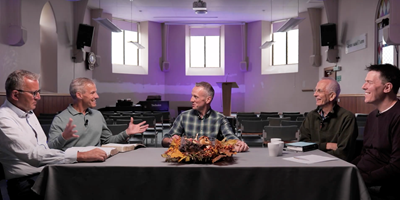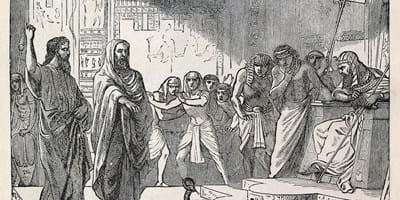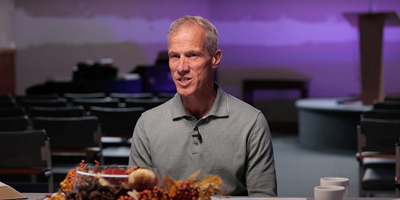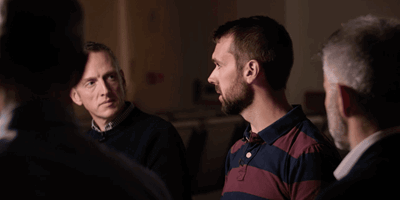The alarm had functioned correctly, alerting the household to our danger. Yet I had chosen to ignore the warning by silencing the noise. Thankfully, no permanent harm was done, but the incident does illustrate how we can silence our consciences, the God-given warning system that helps us distinguish between right and wrong.
J.I. Packer stated, “An educated, sensitive conscience is God’s monitor. It alerts us to the moral quality of what we do or plan to do, forbids lawlessness and irresponsibility, and makes us feel guilt, shame, and fear of the future retribution that it tells us we deserve, when we allow ourselves to defy its restraints.”
Although the conscience is not infallible it has a particularly important role to play in the life of a believer. It is not “the voice of God” in our minds but it is a human faculty that is used by God. Scripture speaks to us about it and the need for it to be informed correctly, acted upon, and kept clean.
You must keep your conscience clean
Every single person has a conscience that operates in accordance with the information the mind receives. The settled convictions of our minds will inform our consciences. So, if our minds are full of false information and assumptions that have led to poor lifestyle choices, our consciences will be ineffective. However, if our minds have been informed through a correct understanding of scripture which has led to a pattern of good moral choices, our consciences will be strengthened.
The conscience works like a window in that it can let light into our souls. Although it does not produce light it must be exposed to light and kept clean to be effective.
When someone says, “I don’t have a conscience about that” before performing a certain action it does not necessarily mean that they are making a good choice. A conscience that has been rendered ineffective through poor information-gathering or past bad choices will not be a useful guide.
The apostle Paul wrote frequently about the conscience and the importance of having a clean one. When he had to answer harsh and undue criticism, he could say that he had a clean conscience regarding his conduct.
“For our boasting is this: the testimony of our conscience that we conducted ourselves in the world in simplicity and godly sincerity, not with fleshly wisdom but by the grace of God, and more abundantly toward you” (2 Corinthians 1:12).
To keep the conscience clean we must act in accordance with its promptings, but to ensure it is functioning correctly it needs to be continually exposed to the light of the Word of God. A well-developed conscience is a remarkably powerful aid to spiritual growth.
You must act in accordance with your conscience
To contravene our consciences, or to encourage anyone else to do so, is sinful. In Romans 14:23, Paul, in speaking about Christian liberty, stated, “But he who doubts is condemned if he eats, because he does not eat from faith; for whatever is not from faith is sin”. When we harbour thoughts or perform actions that the conscience condemns we are disregarding the alarm system that God has given us.
Hopefully, as we strive for a well-informed conscience that is constantly being exposed to the pure light of God’s Word, we can have assurance that we are thinking and acting in accordance with God’s will.
It is when we face difficult choices in life that the conscience comes to the fore. There may be a desire to do something, but the conscience seems to be directing differently. The “alarm bell” is ringing. It is in those situations that we must not “remove the batteries” to “silence the alarm” but must heed the warning.
In the current lockdown situation, there are temptations to go against government requests. There can be a strong pull, not to break the law but to refuse to submit to an appeal. In those times the developed conscience will bring the convicting Word of God to bear on the situation.
“Therefore you must be subject, not only because of wrath but also for conscience' sake” (Romans 13:5).
When we suppress the conscience once, there is a likelihood that we will do so again and be set on a pathway that leads to disaster. Conversely, paying attention to the conscience will greatly aid our spiritual progress.
You must be concerned for the consciences of others
A love for others will ensure that we are concerned about their consciences. In 1 Corinthians chapters 8-10 the conscience is dealt with in great depth.
Paul teaches believers how they are not to violate the conscience of another Christian. The particular issue here was eating meat that had been sacrificed to idols. In Corinth you could go to the marketplace and buy meat that had been used in the pagan temples. The mature believer had knowledge that meant they were not concerned that the food had once been offered to false idols. They knew these deities did not exist and that evil spirits could not pollute the food, so they would happily purchase and eat it.
However, some believers did not have such knowledge. Their conscience was weak in this area as it had not been fully informed by scripture.
“However, there is not in everyone that knowledge; for some, with consciousness of the idol, until now eat it as a thing offered to an idol; and their conscience, being weak, is defiled” (1 Corinthians 8:7).
Paul instructed the strong believers that they must not ride roughshod over the weak, encouraging them to eat the meat and thus go against their consciences. Rather than selfishly exercising their liberty, they must consider the weaker Christians. Not to do so was a sin, not only against them, but also against Christ!
“And because of your knowledge shall the weak brother perish, for whom Christ died? But when you thus sin against the brethren, and wound their weak conscience, you sin against Christ” (1 Corinthians 8:11-12).
There will be issues in life where we know there is liberty to do certain things, but love will limit what conscience permits.
When another believer’s conscience is weak and uninstructed, the strong Christian must not force him to act contrary to it. However, we can instruct such a person and teach him the Word of God more perfectly. True knowledge will lead to liberty.

































